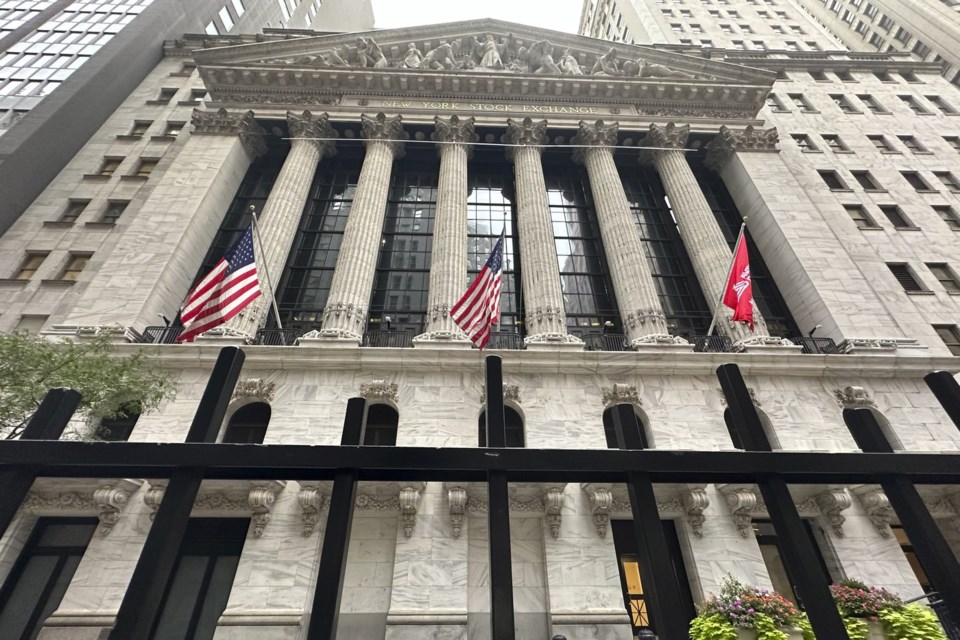NEW YORK (AP) — Wall Street closed its latest winning month and quarter with more records on Monday. The drift higher for U.S. stocks followed a wild start to the week for financial markets in Asia, where Japanese stocks tumbled and Chinese indexes soared. The S&P 500 climbed 0.4% to an all-time high and clinched its fifth straight winning month and fourth straight winning quarter. The Dow Jones Industrial Average added 17 points, or less than 0.1%, to its all-time high set on Friday. The Nasdaq composite rose 0.4%. Treasury yields rose in the bond market.
THIS IS A BREAKING NEWS UPDATE. AP’s earlier story follows below.
NEW YORK (AP) — U.S. stocks are hanging near their records Monday following a wild start to the week for financial markets in Asia, where Japanese stocks tumbled and Chinese indexes soared.
The S&P 500 was 0.1% lower in afternoon trading, coming off its sixth winning week in the last seven. The Dow Jones Industrial Average pulled back 181 points, or 0.4%, from its all-time high set on Friday. The Nasdaq composite was 0.2% lower, with roughly an hour remaining in trading.
It’s a pause for Wall Street following a catapult to records on hopes the slowing U.S. economy can keep growing while the Federal Reserve cuts interest rates to offer it more juice. A big test will arrive Friday, when the U.S. government offers its latest monthly update on the job market.
An overriding worry on Wall Street is whether the economy may already be heading for a recession. Even though the Fed cut rates earlier this month and has indicated more relief is on the way, U.S. employers have already begun paring back on their hiring. Before this month, the Fed had kept interest rates at a two-decade high in hopes of slowing the economy enough to stamp out high inflation.
“Payrolls remain the biggest catalyst” for the U.S. stock market until the election, strategists and economists at Bank of America wrote in a BofA Global Research report.
At Goldman Sachs, economist David Mericle said he’s expecting Friday’s report to show hiring in September was stronger than the 146,000 growth in payrolls that economists across Wall Street are broadly forecasting.
In the past, a stronger-than-expected number could have hurt the stock market by fanning worries about upward pressure on inflation. Now, though, it would likely be welcomed as a signal that a recession shouldn’t be as big a worry.
Interest rates and the strength of the economy are usually the two main levers that set prices for stocks. In Asia, the levers were pulling in opposite directions.
Japan’s Nikkei 225 slumped 4.8% on worries the country’s incoming prime minister will support higher interest rates and other policies that investors see as less market-friendly. Shigeru Ishiba is set to take over on Tuesday.
Ishiba has expressed support for the Bank of Japan’s move to pull interest rates away from their near-zero level, which puts upward pressure on the value of the Japanese yen. A stronger yen can hurt profits for Japanese exporters, which make sales in other currencies and then convert them back into yen.
Toyota Motor’s stock fell 7.6% in Tokyo, while Honda Motor’s dropped 7%. Monday.
Stellantis, the company that owns the Jeep brand and others, tumbled 14.7% in Milan after cutting its forecast for upcoming profit. It cited investments to turn around its U.S. operations and increased Chinese competition.
That in turn helped to drag down automakers Ford Motor and General Motors on Wall Street. Ford fell 2.6%, and GM dropped 3.8%.
Also on Wall Street, cruise-ship operator Carnival lost 1% even though it reported stronger profit and revenue for the latest quarter than analysts expected. It gave a forecast for growth of an important underlying measure of profit in the current quarter that fell short of analysts' estimates.
In China, meanwhile, indexes soared 8.1% in Shanghai and 2.4% in Hong Kong following the latest announcements of stimulus for the world’s second-largest economy. It was the best day for Shanghai stocks in nearly 16 years.
China’s central bank announced moves on Sunday to ease mortgage rates for existing home loans by Oct. 31. That followed a flurry of announcements last week from China’s central bank and government intended to prop up the Chinese economy, whose growth has been flagging in part because of the weight of a struggling real-estate sector.
Markets in mainland China will be closed Tuesday through Oct. 7 for a holiday marking 75 years of communist rule.
In the bond market, U.S. Treasury yields rose after investors took comments from Fed Chair Jerome Powell as a possible hint that coming cuts to rates may be more traditional sized. The Fed began its rate-cutting campaign this month with a larger-than-usual reduction of half a percentage point, and many traders had built expectations that the next meeting in November could yield a similar sized reduction.
But Powell said again on Monday that rate cuts are not something the Fed needs to work quickly on. After his comments, traders were betting on just a 35% probability the Fed will cut rates by another half a percentage point in November. That's down from a 53% chance seen the day before, according to data from CME Group.
The yield on the 10-year Treasury rose to 3.79% from 3.75% late Friday. The two-year yield, which more closely tracks expectations for what the Fed will do with short-term rates, added more. It climbed to 3.65% from 3.56%.
___
AP Writer Zimo Zhong contributed.
Stan Choe, The Associated Press



